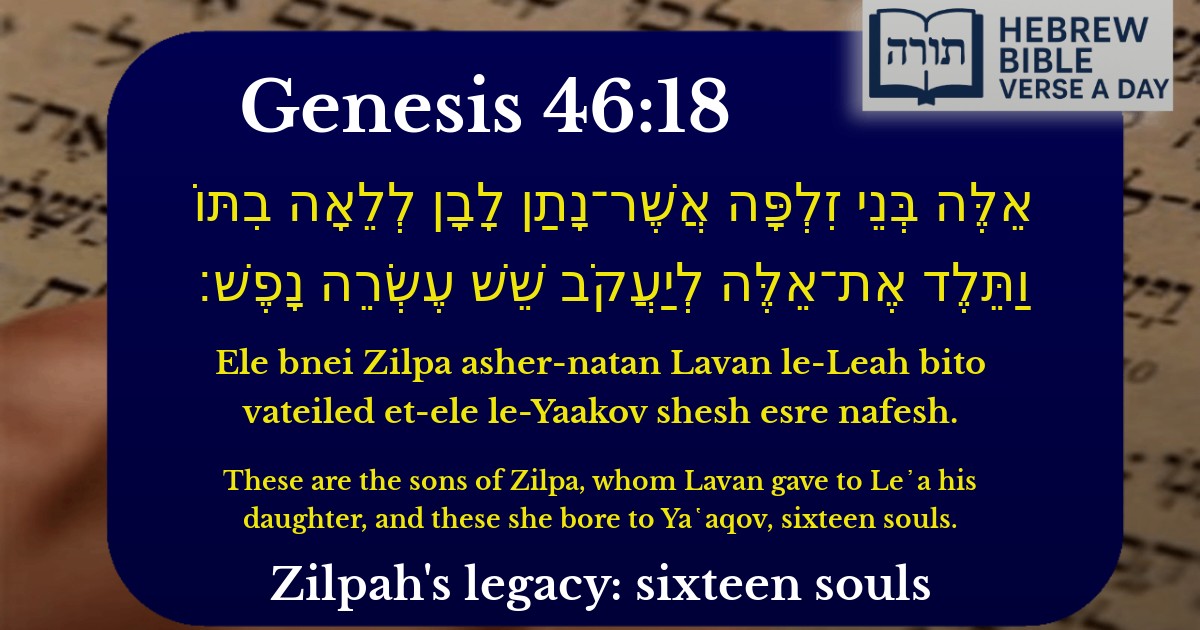Frequently Asked Questions
Q: Who was Zilpah in the Torah?
A: Zilpah was one of the maidservants given by Lavan to his daughter Leah when she married Yaakov (Jacob). According to Rashi (Genesis 29:24), Zilpah was initially Leah's maidservant, and later became a secondary wife to Yaakov, bearing him two sons: Gad and Asher (Genesis 30:9-13).
Q: Why does the Torah mention that Zilpah's descendants were 'sixteen souls'?
A: The Torah counts Zilpah's descendants as 'sixteen souls' to show the fulfillment of Hashem's promise to Yaakov that his offspring would multiply (Genesis 28:14). The Midrash (Bereishit Rabbah 94:9) explains that counting the family members highlights the growth of the Israelite nation, even during their descent to Egypt.
Q: What is the significance of listing Zilpah's children separately in Genesis 46?
A: Listing Zilpah's children separately, like the other wives of Yaakov, shows that all of Yaakov's sons—whether from Leah, Rachel, Bilhah, or Zilpah—were equal founders of the Twelve Tribes. The Ramban (Genesis 46:8) notes that this demonstrates the unity and importance of each tribe in forming the Jewish people.
Q: Why did Lavan give Zilpah to Leah?
A: Rashi (Genesis 29:24) explains that Lavan gave Zilpah to Leah as part of her dowry, a common practice at the time. Later, when Leah temporarily stopped having children, she gave Zilpah to Yaakov as a wife (Genesis 30:9), following the custom of that era to build a family through maidservants when necessary.
Q: How does Zilpah's story apply to us today?
A: Zilpah's story teaches that every individual—regardless of background—plays a vital role in Jewish history. The Talmud (Berachot 7a) emphasizes that even those who seem 'secondary' (like maidservants) can become mothers of tribes. This reminds us to value every person's contribution to the Jewish people.


Context of the Verse
The verse (Genesis 46:18) lists the descendants of Zilpah, the maidservant given by Lavan to his daughter Leah, who bore children to Yaakov. This is part of the enumeration of Yaakov's family as they descend to Egypt.
Rashi's Commentary
Rashi (Rabbi Shlomo Yitzchaki) explains that the phrase "אֵלֶּה בְּנֵי זִלְפָּה" ("These are the sons of Zilpah") emphasizes that despite Zilpah being a maidservant, her children were considered full-fledged members of Yaakov's household, equal to the children born to Leah and Rachel. Rashi also notes that the Torah specifies "אֲשֶׁר־נָתַן לָבָן לְלֵאָה בִתּוֹ" ("whom Lavan gave to Le᾽a his daughter") to clarify that Zilpah was initially given to Leah, not directly to Yaakov, reinforcing the legitimacy of her children.
Significance of "Sixteen Souls"
The verse concludes by stating that Zilpah bore "שֵׁשׁ עֶשְׂרֵה נָפֶשׁ" ("sixteen souls"). The Midrash (Bereshit Rabbah 94:8) elaborates that this count includes not only Zilpah's immediate children (Gad and Asher) but also their descendants, demonstrating how the family multiplied even before entering Egypt. The number sixteen is significant as it reflects the fulfillment of Hashem's promise to Avraham of numerous descendants.
Rambam's Perspective on Servitude and Lineage
Rambam (Maimonides) in Hilchos Issurei Biah (Laws of Forbidden Relationships) discusses the status of children born to maidservants. He affirms that since Zilpah was given to Yaakov through proper kiddushin (sanctification), her children were legitimate heirs, inheriting equally with the other tribes. This aligns with the Torah's emphasis on their inclusion in the count of Yaakov's descendants.
Symbolism of Zilpah's Descendants
The inclusion of these tribes among Yaakov's sons underscores the Torah's teaching that righteousness and tribal status are not diminished by maternal lineage when the union is halachically valid.